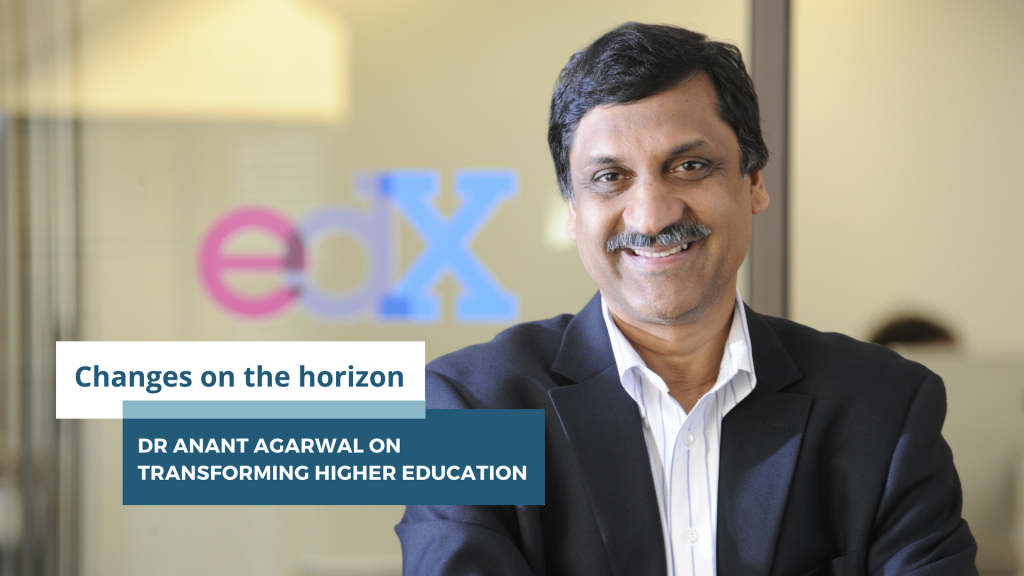Changes on the horizon: Dr Anant Agarwal on transforming higher education
‘During this keynote, I want to dream a little bit with you. I want you to think about what the world will look like in 2030.’
With those words, Dr Anant Agarwal, CEO of edX and professor at MIT, opened his talk about Digital Education Transformation at Studyportals Academy 2018.
After the optimistic prelude, the audience of the event quickly knew that the main subject of the talk would be transformation. In fact, Dr Agarwal was inviting us to consider how the future of global employment could mould and define the way to think about education today:
‘As major transformations are taking place all over the world, the future of work is going to be transformed. That means that today’s education models need to change too.’
What’s daunting about the future direction of employment is that automation and technology will make many of today’s jobs obsolete. In a time when students are searching for studies which guarantee a career track, the way Dr Agarwal imagined higher education adapting and embracing its future was that it would no longer be confined to a campus, a curriculum or a student’s age.
Modular, Omnichannel, and Lifelong education
By 2050, about 66 million of the employed population will need reskilling and upskilling, and a forecasted number of 800 million jobs will be lost due to automation. How can a skilled worker compete with a cheap and accurate piece of software?
In the race with digitalisation, a person would need to renew their skill set at a faster pace than ever before to stay competitive on the job market. At the same time, the speed at which skills demand accelerates forces the global population to adopt a lifelong learning mindset. The combination of these factors creates a fertile ground for a concept like modular education to blossom into a real solution.
Modular education
Consumer control and customisation are two behaviours that have been taking over the customer market for some time now. A modular approach to education opens up a completely new world to universities regarding collaboration and flexibility. Because of this flexibility, a higher education institution can attract a wider range of students to their programmes.
‘In the past, education usually came in 4-year chunks for a Bachelor’s degree or a 1- or 2-year chunk for a Master’s degree. But with modular education, we are creating more time-compressed options’, said Dr Agarwal.
Adopting a modular education system has its benefits, the main one being it’s flexible. Modular education allows for all kinds of combinations. ‘Think of it as a Lego set’, helps us Dr Agarwal: Different modules can be stacked together and combining them into a programme offers students more of what they want in terms of course topics, and when they want it.
Another important benefit of adopting modular as a framework for higher education programmes is that modular content can be shared. To illustrate, Dr Agarwal gave an example of the collaboration between edX and the Information Technology University of Pakistan. The Pakistani university included a Micromaster in Data Science from the University of California in San Diego into their Data Science on-campus curricula. What a great way to give your students a chance to learn from top universities in the world, without the necessity to fly them overseas!
Omnichannel education
In today’s world, more and more consumer brands are employing an omnichannel presence. Take for example Amazon, suggested Dr Agarwal. In 2017, the giant acquired Whole Foods, a move that came as a surprise to some. In fact, the acquisition of physical stores by the e-commerce platform was a strategic step to expand their presence.
In Dr Agarwal’s opinion, the trail was blazed for education to follow and adopt a more omnichannel-oriented strategy. Omnichannel, in this case, would mean holding both an online and offline presence, especially when it comes to course curricula.
‘I really believe that universities have to go omnichannel if they want to innovate in the future. Otherwise, as education becomes more and more lifelong, universities will bypass a unique opportunity for accessibility, credibility and innovation’, said Dr Agarwal during his keynote.
Lifelong education
The way society is changing has created a need for lifelong learning. Against the backdrop of increasing life expectancy rates coupled with digitalisation, education cannot be withheld only within the traditional college or university years. Active learning is becoming very much a daily activity.
Not only does lifelong learning enhance social inclusion, active citizenship and individual development, but has a positive impact on competitiveness and employability. Upskilling and reskilling bring very concrete benefits:
- Higher job satisfaction levels
- A boost in motivation, which in turn will stimulate people to go above and beyond in their learning endeavours and in their jobs
- Increased productivity and efficiency
- Fewer mistakes, accidents and incidents taking place on the job
‘New initiatives which offer professional credentials and certificates online are becoming more prominent, as they empower people to gain skills, build their personal brands on platforms such as LinkedIn, and receive corporate endorsements’.
This trend is an indicator for higher education institutions to start looking at non-traditional demographic segments of future students. Currently, the bulk of students universities attract are between 18 and 25-year-olds. With lifelong learning, they could tap into new age markets of prospective students. People in their 30s and 40s will increasingly start looking for educational opportunities, either to refresh certain skills or to switch career paths. Here is where higher education institutions can reinvent their models have an important impact on the world.
edX and the future of education
Dr Agarwal and the edX team are actively contributing to education’s transformation by creating new paths to career development, aimed at preventing and eliminating current and future skill gaps.
If we can collectively enable a steady access to modular education, a growing number people will have the security of jobs that will not become obsolete. Such a massive-scale shift in the way we organise education will bring a tangible change for the better.
As Dr Agarwal put it at the end of his keynote:
For more updates, follow us!‘I see the future of education as being modular, omnichannel and lifelong. Everybody, whether we are talking about universities, learners, corporations, small companies, should be mindful of these three trends if they want to be truly successful in the future.’






